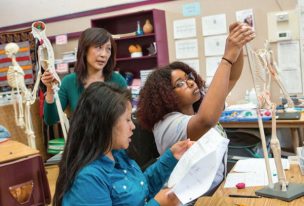Oakland Computer Science Teacher Scholars Spotlight
How do we get students comfortable with uncertainty? What does it look like to give permission to struggle? How do I evaluate risk-taking? What kinds of peer collaboration support effective problem-solving?
These and other questions about productive struggle drive the inquiry work of Oakland’s Computer Science Teacher Scholars. Representing ten different middle and high schools, these teachers come together one evening a month to share uncertainties and successes and support each other in teacher-led collaborative inquiry.
Their work to understand and develop best practices for teaching Computer Science to Oakland’s students comes at a critical juncture, as the district is currently increasing its computer science offerings with the goal of having computer science at every middle and high school by 2017-18. In many cases, these teacher scholars are the only Computer Science teachers at their sites, and our monthly sessions provide a valuable opportunity to connect with colleagues teaching the same subject matter and facing similar essential questions.
While each teacher selected their own inquiry focus at the start of the year, a few clear threads have emerged that link their work together. Ongoing discussion of these larger questions underscores the teachers’ work as they pursue their individual inquiries.
How can we support our students to engage in productive struggle?
From the get-go, this question came to the forefront for most of the Computer Science Teacher Scholars. Steve Wright from Oakland Tech, for instance, is exploring how to structure his classroom environment so that his students come to share his own belief in “understanding over answers.” Through analyzing student reflections on coding activities and observing their level of engagement in various tasks, he is learning the degree to which developing relational trust between himself and his students is critical to their willingness to take cognitive risks. Pairing similarly-skilled students together, he has learned, can also be more effective than creating heterogeneous pairs in which one student is likely to “lead” and the other merely to “follow.”
Alefiyah Lokhandwala from Roots International Academy is also thinking about productive struggle, using peer collaboration as the mechanism to make it happen. Through analyzing audio recordings of her students’ pair-share conversations, she is learning that in successful collaborations students ask each other specific questions that identify the part of the task in which they need help. A supportive peer will follow up with further questions such as “What have you done already? What have you done right? How can you check?” Alefiyah has changed her teaching to include specific instruction in how to support a partner without providing answers. She is also planning to offer probing-question cards as a scaffold for students who need support helping their peers get unstuck.
How can we support students’ technical writing?
Tackling the unique genre of technical writing is another common thread uniting teachers’ inquiries in the group. Flint Christensen from Skyline High is investigating how to provide clear and specific feedback to support his students’ use of writing as a tool to express their technical understanding. A breakthrough came when a colleague shared with him a writing rubric from Engage New York that helped him define his criteria for success in his students’ written responses. He plans to share those criteria with his students and to work with them to develop an understanding of the characteristics of strong writing in Computer Science.
William Juang from Life Academy is also exploring best practices in teaching technical writing, focusing on argumentation. Through analyzing audio recordings of focal students explaining and justifying their coding choices, he is developing his understanding of how his students articulate claims and reason about them effectively. In their writing assignments, he is looking for evidence of logical reasoning and is thinking about how he can help students apply this skill across the different units of his curriculum, from coding to genetics.
Through these monthly meetings engaging in collaborative inquiry on questions of their own choosing, these educators are refining their understanding of what it means to teach all students well. They themselves are engaging in productive struggle as month after month they tackle difficult questions with no easy answers about curriculum, pedagogy, social-emotional skills, and evaluation. They are building connections with each other that go beyond grade-level and school site and provide inspiration for instructional innovation.
A group of these remarkable teachers will participate in a panel, “Building a Culture of Productive Struggle and Problem-Solving in the Classroom,” at our Teacher Inquiry in Action Forum at Mills College on March 23rd. Join us to hear about their inquiries first-hand and to join in the conversation about creating expert problem-solvers in our classrooms.


